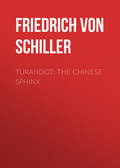
Фридрих Шиллер
The Thirty Years War – Complete
The Emperor, we are told by Khevenhuller, showed symptoms of deep, and apparently sincere feeling, at the sight of the king’s doublet stained with blood, which had been stripped from him during the battle, and carried to Vienna. “Willingly,” said he, “would I have granted to the unfortunate prince a longer life, and a safe return to his kingdom, had Germany been at peace.” But when a trait, which is nothing more than a proof of a yet lingering humanity, and which a mere regard to appearances and even self-love, would have extorted from the most insensible, and the absence of which could exist only in the most inhuman heart, has, by a Roman Catholic writer of modern times and acknowledged merit, been made the subject of the highest eulogium, and compared with the magnanimous tears of Alexander, for the fall of Darius, our distrust is excited of the other virtues of the writer’s hero, and what is still worse, of his own ideas of moral dignity. But even such praise, whatever its amount, is much for one, whose memory his biographer has to clear from the suspicion of being privy to the assassination of a king.
It was scarcely to be expected, that the strong leaning of mankind to the marvellous, would leave to the common course of nature the glory of ending the career of Gustavus Adolphus. The death of so formidable a rival was too important an event for the Emperor, not to excite in his bitter opponent a ready suspicion, that what was so much to his interests, was also the result of his instigation. For the execution, however, of this dark deed, the Emperor would require the aid of a foreign arm, and this it was generally believed he had found in Francis Albert, Duke of Saxe Lauenburg. The rank of the latter permitted him a free access to the king’s person, while it at the same time seemed to place him above the suspicion of so foul a deed. This prince, however, was in fact not incapable of this atrocity, and he had moreover sufficient motives for its commission.
Francis Albert, the youngest of four sons of Francis II, Duke of Lauenburg, and related by the mother’s side to the race of Vasa, had, in his early years, found a most friendly reception at the Swedish court. Some offence which he had committed against Gustavus Adolphus, in the queen’s chamber, was, it is said, repaid by this fiery youth with a box on the ear; which, though immediately repented of, and amply apologized for, laid the foundation of an irreconcileable hate in the vindictive heart of the duke. Francis Albert subsequently entered the imperial service, where he rose to the command of a regiment, and formed a close intimacy with Wallenstein, and condescended to be the instrument of a secret negociation with the Saxon court, which did little honour to his rank. Without any sufficient cause being assigned, he suddenly quitted the Austrian service, and appeared in the king’s camp at Nuremberg, to offer his services as a volunteer. By his show of zeal for the Protestant cause, and prepossessing and flattering deportment, he gained the heart of the king, who, warned in vain by Oxenstiern, continued to lavish his favour and friendship on this suspicious new comer. The battle of Lutzen soon followed, in which Francis Albert, like an evil genius, kept close to the king’s side and did not leave him till he fell. He owed, it was thought, his own safety amidst the fire of the enemy, to a green sash which he wore, the colour of the Imperialists. He was at any rate the first to convey to his friend Wallenstein the intelligence of the king’s death. After the battle, he exchanged the Swedish service for the Saxon; and, after the murder of Wallenstein, being charged with being an accomplice of that general, he only escaped the sword of justice by abjuring his faith. His last appearance in life was as commander of an imperial army in Silesia, where he died of the wounds he had received before Schweidnitz. It requires some effort to believe in the innocence of a man, who had run through a career like this, of the act charged against him; but, however great may be the moral and physical possibility of his committing such a crime, it must still be allowed that there are no certain grounds for imputing it to him. Gustavus Adolphus, it is well known, exposed himself to danger, like the meanest soldier in his army, and where thousands fell, he, too, might naturally meet his death. How it reached him, remains indeed buried in mystery; but here, more than anywhere, does the maxim apply, that where the ordinary course of things is fully sufficient to account for the fact, the honour of human nature ought not to be stained by any suspicion of moral atrocity.
But by whatever hand he fell, his extraordinary destiny must appear a great interposition of Providence. History, too often confined to the ungrateful task of analyzing the uniform play of human passions, is occasionally rewarded by the appearance of events, which strike like a hand from heaven, into the nicely adjusted machinery of human plans, and carry the contemplative mind to a higher order of things. Of this kind, is the sudden retirement of Gustavus Adolphus from the scene; – stopping for a time the whole movement of the political machine, and disappointing all the calculations of human prudence. Yesterday, the very soul, the great and animating principle of his own creation; to-day, struck unpitiably to the ground in the very midst of his eagle flight; untimely torn from a whole world of great designs, and from the ripening harvest of his expectations, he left his bereaved party disconsolate; and the proud edifice of his past greatness sunk into ruins. The Protestant party had identified its hopes with its invincible leader, and scarcely can it now separate them from him; with him, they now fear all good fortune is buried. But it was no longer the benefactor of Germany who fell at Lutzen: the beneficent part of his career, Gustavus Adolphus had already terminated; and now the greatest service which he could render to the liberties of Germany was – to die. The all-engrossing power of an individual was at an end, but many came forward to essay their strength; the equivocal assistance of an over-powerful protector, gave place to a more noble self-exertion on the part of the Estates; and those who were formerly the mere instruments of his aggrandizement, now began to work for themselves. They now looked to their own exertions for the emancipation, which could not be received without danger from the hand of the mighty; and the Swedish power, now incapable of sinking into the oppressor, was henceforth restricted to the more modest part of an ally.
The ambition of the Swedish monarch aspired unquestionably to establish a power within Germany, and to attain a firm footing in the centre of the empire, which was inconsistent with the liberties of the Estates. His aim was the imperial crown; and this dignity, supported by his power, and maintained by his energy and activity, would in his hands be liable to more abuse than had ever been feared from the House of Austria. Born in a foreign country, educated in the maxims of arbitrary power, and by principles and enthusiasm a determined enemy to Popery, he was ill qualified to maintain inviolate the constitution of the German States, or to respect their liberties. The coercive homage which Augsburg, with many other cities, was forced to pay to the Swedish crown, bespoke the conqueror, rather than the protector of the empire; and this town, prouder of the title of a royal city, than of the higher dignity of the freedom of the empire, flattered itself with the anticipation of becoming the capital of his future kingdom. His ill-disguised attempts upon the Electorate of Mentz, which he first intended to bestow upon the Elector of Brandenburg, as the dower of his daughter Christina, and afterwards destined for his chancellor and friend Oxenstiern, evinced plainly what liberties he was disposed to take with the constitution of the empire. His allies, the Protestant princes, had claims on his gratitude, which could be satisfied only at the expense of their Roman Catholic neighbours, and particularly of the immediate Ecclesiastical Chapters; and it seems probable a plan was early formed for dividing the conquered provinces, (after the precedent of the barbarian hordes who overran the German empire,) as a common spoil, among the German and Swedish confederates. In his treatment of the Elector Palatine, he entirely belied the magnanimity of the hero, and forgot the sacred character of a protector. The Palatinate was in his hands, and the obligations both of justice and honour demanded its full and immediate restoration to the legitimate sovereign. But, by a subtlety unworthy of a great mind, and disgraceful to the honourable title of protector of the oppressed, he eluded that obligation. He treated the Palatinate as a conquest wrested from the enemy, and thought that this circumstance gave him a right to deal with it as he pleased. He surrendered it to the Elector as a favour, not as a debt; and that, too, as a Swedish fief, fettered by conditions which diminished half its value, and degraded this unfortunate prince into a humble vassal of Sweden. One of these conditions obliged the Elector, after the conclusion of the war, to furnish, along with the other princes, his contribution towards the maintenance of the Swedish army, a condition which plainly indicates the fate which, in the event of the ultimate success of the king, awaited Germany. His sudden disappearance secured the liberties of Germany, and saved his reputation, while it probably spared him the mortification of seeing his own allies in arms against him, and all the fruits of his victories torn from him by a disadvantageous peace. Saxony was already disposed to abandon him, Denmark viewed his success with alarm and jealousy; and even France, the firmest and most potent of his allies, terrified at the rapid growth of his power and the imperious tone which he assumed, looked around at the very moment he past the Lech, for foreign alliances, in order to check the progress of the Goths, and restore to Europe the balance of power.
BOOK IV
The weak bond of union, by which Gustavus Adolphus contrived to hold together the Protestant members of the empire, was dissolved by his death: the allies were now again at liberty, and their alliance, to last, must be formed anew. By the former event, if unremedied, they would lose all the advantages they had gained at the cost of so much bloodshed, and expose themselves to the inevitable danger of becoming one after the other the prey of an enemy, whom, by their union alone, they had been able to oppose and to master. Neither Sweden, nor any of the states of the empire, was singly a match with the Emperor and the League; and, by seeking a peace under the present state of things, they would necessarily be obliged to receive laws from the enemy. Union was, therefore, equally indispensable, either for concluding a peace or continuing the war. But a peace, sought under the present circumstances, could not fail to be disadvantageous to the allied powers. With the death of Gustavus Adolphus, the enemy had formed new hopes; and however gloomy might be the situation of his affairs after the battle of Lutzen, still the death of his dreaded rival was an event too disastrous to the allies, and too favourable for the Emperor, not to justify him in entertaining the most brilliant expectations, and not to encourage him to the prosecution of the war. Its inevitable consequence, for the moment at least, must be want of union among the allies, and what might not the Emperor and the League gain from such a division of their enemies? He was not likely to sacrifice such prospects, as the present turn of affairs held out to him, for any peace, not highly beneficial to himself; and such a peace the allies would not be disposed to accept. They naturally determined, therefore, to continue the war, and for this purpose, the maintenance of the existing union was acknowledged to be indispensable.
But how was this union to be renewed? and whence were to be derived the necessary means for continuing the war? It was not the power of Sweden, but the talents and personal influence of its late king, which had given him so overwhelming an influence in Germany, so great a command over the minds of men; and even he had innumerable difficulties to overcome, before he could establish among the states even a weak and wavering alliance. With his death vanished all, which his personal qualities alone had rendered practicable; and the mutual obligation of the states seemed to cease with the hopes on which it had been founded. Several impatiently threw off the yoke which had always been irksome; others hastened to seize the helm which they had unwillingly seen in the hands of Gustavus, but which, during his lifetime, they did not dare to dispute with him. Some were tempted, by the seductive promises of the Emperor, to abandon the alliance; others, oppressed by the heavy burdens of a fourteen years’ war, longed for the repose of peace, upon any conditions, however ruinous. The generals of the army, partly German princes, acknowledged no common head, and no one would stoop to receive orders from another. Unanimity vanished alike from the cabinet and the field, and their common weal was threatened with ruin, by the spirit of disunion.
Gustavus had left no male heir to the crown of Sweden: his daughter Christina, then six years old, was the natural heir. The unavoidable weakness of a regency, suited ill with that energy and resolution, which Sweden would be called upon to display in this trying conjuncture. The wide reaching mind of Gustavus Adolphus had raised this unimportant, and hitherto unknown kingdom, to a rank among the powers of Europe, which it could not retain without the fortune and genius of its author, and from which it could not recede, without a humiliating confession of weakness. Though the German war had been conducted chiefly on the resources of Germany, yet even the small contribution of men and money, which Sweden furnished, had sufficed to exhaust the finances of that poor kingdom, and the peasantry groaned beneath the imposts necessarily laid upon them. The plunder gained in Germany enriched only a few individuals, among the nobles and the soldiers, while Sweden itself remained poor as before. For a time, it is true, the national glory reconciled the subject to these burdens, and the sums exacted, seemed but as a loan placed at interest, in the fortunate hand of Gustavus Adolphus, to be richly repaid by the grateful monarch at the conclusion of a glorious peace. But with the king’s death this hope vanished, and the deluded people now loudly demanded relief from their burdens.
But the spirit of Gustavus Adolphus still lived in the men to whom he had confided the administration of the kingdom. However dreadful to them, and unexpected, was the intelligence of his death, it did not deprive them of their manly courage; and the spirit of ancient Rome, under the invasion of Brennus and Hannibal, animated this noble assembly. The greater the price, at which these hard-gained advantages had been purchased, the less readily could they reconcile themselves to renounce them: not unrevenged was a king to be sacrificed. Called on to choose between a doubtful and exhausting war, and a profitable but disgraceful peace, the Swedish council of state boldly espoused the side of danger and honour; and with agreeable surprise, men beheld this venerable senate acting with all the energy and enthusiasm of youth. Surrounded with watchful enemies, both within and without, and threatened on every side with danger, they armed themselves against them all, with equal prudence and heroism, and laboured to extend their kingdom, even at the moment when they had to struggle for its existence.
The decease of the king, and the minority of his daughter Christina, renewed the claims of Poland to the Swedish throne; and King Ladislaus, the son of Sigismund, spared no intrigues to gain a party in Sweden. On this ground, the regency lost no time in proclaiming the young queen, and arranging the administration of the regency. All the officers of the kingdom were summoned to do homage to their new princess; all correspondence with Poland prohibited, and the edicts of previous monarchs against the heirs of Sigismund, confirmed by a solemn act of the nation. The alliance with the Czar of Muscovy was carefully renewed, in order, by the arms of this prince, to keep the hostile Poles in check. The death of Gustavus Adolphus had put an end to the jealousy of Denmark, and removed the grounds of alarm which had stood in the way of a good understanding between the two states. The representations by which the enemy sought to stir up Christian IV. against Sweden were no longer listened to; and the strong wish the Danish monarch entertained for the marriage of his son Ulrick with the young princess, combined, with the dictates of a sounder policy, to incline him to a neutrality. At the same time, England, Holland, and France came forward with the gratifying assurances to the regency of continued friendship and support, and encouraged them, with one voice, to prosecute with activity the war, which hitherto had been conducted with so much glory. Whatever reason France might have to congratulate itself on the death of the Swedish conqueror, it was as fully sensible of the expediency of maintaining the alliance with Sweden. Without exposing itself to great danger, it could not allow the power of Sweden to sink in Germany. Want of resources of its own, would either drive Sweden to conclude a hasty and disadvantageous peace with Austria, and then all the past efforts to lower the ascendancy of this dangerous power would be thrown away; or necessity and despair would drive the armies to extort from the Roman Catholic states the means of support, and France would then be regarded as the betrayer of those very states, who had placed themselves under her powerful protection. The death of Gustavus, far from breaking up the alliance between France and Sweden, had only rendered it more necessary for both, and more profitable for France. Now, for the first time, since he was dead who had stretched his protecting arm over Germany, and guarded its frontiers against the encroaching designs of France, could the latter safely pursue its designs upon Alsace, and thus be enabled to sell its aid to the German Protestants at a dearer rate.
Strengthened by these alliances, secured in its interior, and defended from without by strong frontier garrisons and fleets, the regency did not delay an instant to continue a war, by which Sweden had little of its own to lose, while, if success attended its arms, one or more of the German provinces might be won, either as a conquest, or indemnification of its expenses. Secure amidst its seas, Sweden, even if driven out of Germany, would scarcely be exposed to greater peril, than if it voluntarily retired from the contest, while the former measure was as honourable, as the latter was disgraceful. The more boldness the regency displayed, the more confidence would they inspire among their confederates, the more respect among their enemies, and the more favourable conditions might they anticipate in the event of peace. If they found themselves too weak to execute the wide-ranging projects of Gustavus, they at least owed it to this lofty model to do their utmost, and to yield to no difficulty short of absolute necessity. Alas, that motives of self-interest had too great a share in this noble determination, to demand our unqualified admiration! For those who had nothing themselves to suffer from the calamities of war, but were rather to be enriched by it, it was an easy matter to resolve upon its continuation; for the German empire was, in the end, to defray the expenses; and the provinces on which they reckoned, would be cheaply purchased with the few troops they sacrificed to them, and with the generals who were placed at the head of armies, composed for the most part of Germans, and with the honourable superintendence of all the operations, both military and political.
But this superintendence was irreconcileable with the distance of the Swedish regency from the scene of action, and with the slowness which necessarily accompanies all the movements of a council.
To one comprehensive mind must be intrusted the management of Swedish interests in Germany, and with full powers to determine at discretion all questions of war and peace, the necessary alliances, or the acquisitions made. With dictatorial power, and with the whole influence of the crown which he was to represent, must this important magistrate be invested, in order to maintain its dignity, to enforce united and combined operations, to give effect to his orders, and to supply the place of the monarch whom he succeeded. Such a man was found in the Chancellor Oxenstiern, the first minister, and what is more, the friend of the deceased king, who, acquainted with all the secrets of his master, versed in the politics of Germany, and in the relations of all the states of Europe, was unquestionably the fittest instrument to carry out the plans of Gustavus Adolphus in their full extent.
Oxenstiern was on his way to Upper Germany, in order to assemble the four Upper Circles, when the news of the king’s death reached him at Hanau. This was a heavy blow, both to the friend and the statesman. Sweden, indeed, had lost but a king, Germany a protector; but Oxenstiern, the author of his fortunes, the friend of his soul, and the object of his admiration. Though the greatest sufferer in the general loss, he was the first who by his energy rose from the blow, and the only one qualified to repair it. His penetrating glance foresaw all the obstacles which would oppose the execution of his plans, the discouragement of the estates, the intrigues of hostile courts, the breaking up of the confederacy, the jealousy of the leaders, and the dislike of princes of the empire to submit to foreign authority. But even this deep insight into the existing state of things, which revealed the whole extent of the evil, showed him also the means by which it might be overcome. It was essential to revive the drooping courage of the weaker states, to meet the secret machinations of the enemy, to allay the jealousy of the more powerful allies, to rouse the friendly powers, and France in particular, to active assistance; but above all, to repair the ruined edifice of the German alliance, and to reunite the scattered strength of the party by a close and permanent bond of union. The dismay which the loss of their leader occasioned the German Protestants, might as readily dispose them to a closer alliance with Sweden, as to a hasty peace with the Emperor; and it depended entirely upon the course pursued, which of these alternatives they would adopt. Every thing might be lost by the slightest sign of despondency; nothing, but the confidence which Sweden showed in herself, could kindle among the Germans a noble feeling of self-confidence. All the attempts of Austria, to detach these princes from the Swedish alliance, would be unavailing, the moment their eyes became opened to their true interests, and they were instigated to a public and formal breach with the Emperor.
Before these measures could be taken, and the necessary points settled between the regency and their minister, a precious opportunity of action would, it is true, be lost to the Swedish army, of which the enemy would be sure to take the utmost advantage. It was, in short, in the power of the Emperor totally to ruin the Swedish interest in Germany, and to this he was actually invited by the prudent councils of the Duke of Friedland. Wallenstein advised him to proclaim a universal amnesty, and to meet the Protestant states with favourable conditions. In the first consternation produced by the fall of Gustavus Adolphus, such a declaration would have had the most powerful effects, and probably would have brought the wavering states back to their allegiance. But blinded by this unexpected turn of fortune, and infatuated by Spanish counsels, he anticipated a more brilliant issue from war, and, instead of listening to these propositions of an accommodation, he hastened to augment his forces. Spain, enriched by the grant of the tenth of the ecclesiastical possessions, which the pope confirmed, sent him considerable supplies, negociated for him at the Saxon court, and hastily levied troops for him in Italy to be employed in Germany. The Elector of Bavaria also considerably increased his military force; and the restless disposition of the Duke of Lorraine did not permit him to remain inactive in this favourable change of fortune. But while the enemy were thus busy to profit by the disaster of Sweden, Oxenstiern was diligent to avert its most fatal consequences.
Less apprehensive of open enemies, than of the jealousy of the friendly powers, he left Upper Germany, which he had secured by conquests and alliances, and set out in person to prevent a total defection of the Lower German states, or, what would have been almost equally ruinous to Sweden, a private alliance among themselves. Offended at the boldness with which the chancellor assumed the direction of affairs, and inwardly exasperated at the thought of being dictated to by a Swedish nobleman, the Elector of Saxony again meditated a dangerous separation from Sweden; and the only question in his mind was, whether he should make full terms with the Emperor, or place himself at the head of the Protestants and form a third party in Germany. Similar ideas were cherished by Duke Ulric of Brunswick, who, indeed, showed them openly enough by forbidding the Swedes from recruiting within his dominions, and inviting the Lower Saxon states to Luneburg, for the purpose of forming a confederacy among themselves. The Elector of Brandenburg, jealous of the influence which Saxony was likely to attain in Lower Germany, alone manifested any zeal for the interests of the Swedish throne, which, in thought, he already destined for his son. At the court of Saxony, Oxenstiern was no doubt honourably received; but, notwithstanding the personal efforts of the Elector of Brandenburg, empty promises of continued friendship were all which he could obtain. With the Duke of Brunswick he was more successful, for with him he ventured to assume a bolder tone. Sweden was at the time in possession of the See of Magdeburg, the bishop of which had the power of assembling the Lower Saxon circle. The chancellor now asserted the rights of the crown, and by this spirited proceeding, put a stop for the present to this dangerous assembly designed by the duke. The main object, however, of his present journey and of his future endeavours, a general confederacy of the Protestants, miscarried entirely, and he was obliged to content himself with some unsteady alliances in the Saxon circles, and with the weaker assistance of Upper Germany.
As the Bavarians were too powerful on the Danube, the assembly of the four Upper Circles, which should have been held at Ulm, was removed to Heilbronn, where deputies of more than twelve cities of the empire, with a brilliant crowd of doctors, counts, and princes, attended. The ambassadors of foreign powers likewise, France, England, and Holland, attended this Congress, at which Oxenstiern appeared in person, with all the splendour of the crown whose representative he was. He himself opened the proceedings, and conducted the deliberations. After receiving from all the assembled estates assurances of unshaken fidelity, perseverance, and unity, he required of them solemnly and formally to declare the Emperor and the league as enemies. But desirable as it was for Sweden to exasperate the ill-feeling between the emperor and the estates into a formal rupture, the latter, on the other hand, were equally indisposed to shut out the possibility of reconciliation, by so decided a step, and to place themselves entirely in the hands of the Swedes. They maintained, that any formal declaration of war was useless and superfluous, where the act would speak for itself, and their firmness on this point silenced at last the chancellor. Warmer disputes arose on the third and principal article of the treaty, concerning the means of prosecuting the war, and the quota which the several states ought to furnish for the support of the army. Oxenstiern’s maxim, to throw as much as possible of the common burden on the states, did not suit very well with their determination to give as little as possible. The Swedish chancellor now experienced, what had been felt by thirty emperors before him, to their cost, that of all difficult undertakings, the most difficult was to extort money from the Germans. Instead of granting the necessary sums for the new armies to be raised, they eloquently dwelt upon the calamities occasioned by the former, and demanded relief from the old burdens, when they were required to submit to new. The irritation which the chancellor’s demand for money raised among the states, gave rise to a thousand complaints; and the outrages committed by the troops, in their marches and quarters, were dwelt upon with a startling minuteness and truth.
In the service of two absolute monarchs, Oxenstiern had but little opportunity to become accustomed to the formalities and cautious proceedings of republican deliberations, or to bear opposition with patience. Ready to act, the instant the necessity of action was apparent, and inflexible in his resolution, when he had once taken it, he was at a loss to comprehend the inconsistency of most men, who, while they desire the end, are yet averse to the means. Prompt and impetuous by nature, he was so on this occasion from principle; for every thing depended on concealing the weakness of Sweden, under a firm and confident speech, and by assuming the tone of a lawgiver, really to become so. It was nothing wonderful, therefore, if, amidst these interminable discussions with German doctors and deputies, he was entirely out of his sphere, and if the deliberateness which distinguishes the character of the Germans in their public deliberations, had driven him almost to despair. Without respecting a custom, to which even the most powerful of the emperors had been obliged to conform, he rejected all written deliberations which suited so well with the national slowness of resolve. He could not conceive how ten days could be spent in debating a measure, which with himself was decided upon its bare suggestion. Harshly, however, as he treated the States, he found them ready enough to assent to his fourth motion, which concerned himself. When he pointed out the necessity of giving a head and a director to the new confederation, that honour was unanimously assigned to Sweden, and he himself was humbly requested to give to the common cause the benefit of his enlightened experience, and to take upon himself the burden of the supreme command. But in order to prevent his abusing the great powers thus conferred upon him, it was proposed, not without French influence, to appoint a number of overseers, in fact, under the name of assistants, to control the expenditure of the common treasure, and to consult with him as to the levies, marches, and quarterings of the troops. Oxenstiern long and strenuously resisted this limitation of his authority, which could not fail to trammel him in the execution of every enterprise requiring promptitude or secrecy, and at last succeeded, with difficulty, in obtaining so far a modification of it, that his management in affairs of war was to be uncontrolled. The chancellor finally approached the delicate point of the indemnification which Sweden was to expect at the conclusion of the war, from the gratitude of the allies, and flattered himself with the hope that Pomerania, the main object of Sweden, would be assigned to her, and that he would obtain from the provinces, assurances of effectual cooperation in its acquisition. But he could obtain nothing more than a vague assurance, that in a general peace the interests of all parties would be attended to. That on this point, the caution of the estates was not owing to any regard for the constitution of the empire, became manifest from the liberality they evinced towards the chancellor, at the expense of the most sacred laws of the empire. They were ready to grant him the archbishopric of Mentz, (which he already held as a conquest,) and only with difficulty did the French ambassador succeed in preventing a step, which was as impolitic as it was disgraceful. Though on the whole, the result of the congress had fallen far short of Oxenstiern’s expectations, he had at least gained for himself and his crown his main object, namely, the direction of the whole confederacy; he had also succeeded in strengthening the bond of union between the four upper circles, and obtained from the states a yearly contribution of two millions and a half of dollars, for the maintenance of the army.







